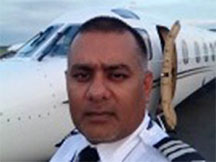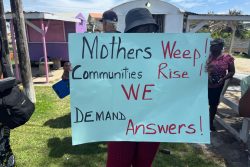Guyanese pilot Khamraj Lall, who was found with US$620,000 stashed onboard his plane in Puerto Rico, is expected to plead guilty to bulk cash smuggling and yesterday asked for more time to conclude negotiations.
District Judge Jay A Garcia-Gregory had given yesterday’s date as the deadline for Lall to change his plea but his lawyer Rafael F. Castro Lang, in a motion filed yesterday, requested an extension.
“The parties are actively pursuing a plea agreement but need additional time since it is being contemplated that this case pursuant to Federal Rule of Criminal Procedure 20 be transferred to New Jersey for purposes of plea and sentencing,” the lawyer said in the motion.

He also stated that a trial is not being contemplated and argued that it is impossible for the parties to conclude plea negotiations by February 17th and February 23rd, the dates set for pre-trial and commencement of the trial, respectively.
As a result, the lawyer asked for an extension of 30 days, while adding that the government does not oppose the extension request.
Searches of Lall’s private aircraft during a refueling stop at the Luis Munoz International Airport, in San Juan, on November 22nd last year, uncovered the cash. US$150,000 was wrapped in plastic bags and a blanket under the exit row seat and US$470,000, in a black suitcase, was found inside a compartment next to the engines. Lall was travelling to Guyana at the time.
Lall, authorities said, accepted responsibility and ownership for the money and informed that his co-pilot and his father, who were travelling with him at the time, had nothing to do with the cash.
According to the grand jury indictment, Lall, with the intent to evade a currency reporting requirement, knowingly concealed more than US$10,000 in currency and other monetary instruments and transported and transferred and attempted to transport and transfer such currency and monetary instruments from a place in the US, that is, Puerto Rico, to a place outside the US, that is, Guyana, in violation of United States Code 5332(a) (1) and (2).
Meanwhile, local authorities are still to decide on what to do about the private hangar Lall was building at the Cheddi Jagan International Airport (CJIA).
“We are still examining the matter with the legal people,” Minister of Transport Robeson Benn told Stabroek News, when asked for an update on Thursday.
Benn said that the complexity in making a decision on what happens to the hanger, now that Lall faces litigation, is due to the fact that the hangar was not given to Lall but to his company, which still exists. “The hangar was rented to a company and not the man… the company, however, has ceased operations here. So, there is no operations here but it still exists,” he said.
Stabroek News understands that since Lall’s incarceration in Puerto Rico, the hangar has not been operational nor does anyone visit the premises.
In addition to bulk cash smuggling, Lall is also the subject of a forfeiture action brought by the US government for a total of US$442,743 held in 14 accounts controlled by him, his wife Nadinee, his mother or connected businesses.
According to United States authorities, during a three-and-a-half year period, over 1,000 deposits totaling US$6.3 million were strategically placed into bank accounts controlled by Lall and his mother Joyce Lall in order to avoid detection of the movements of the funds. The authorities contend that deposits into the accounts were illegally “structured” to avoid the filing of currency transaction reports (CTRs), while the funds were used, in part, to purchase and/or improve Lall’s “nonmonetary properties,” comprising real estate, aircraft and a Lexus vehicle.
In addition to cash held in the 14 bank accounts, authorities are also going after three properties owned by the couple, the aircraft and the Lexus vehicle.
In a court filing last December in the civil court of New Jersey, authorities noted that when US domestic financial institutions are involved in a transaction for the payment, receipt or transfer of US currency in an amount greater than US$10,000, they are required to file the CTRs.
The CTRs, which are filed with the Internal Revenue Service (IRS), require disclosure of the identity of the individual who conducted the transaction and the individual organisation for whom the transaction was completed.
It was also noted that many individuals involved in illegal activities, such as tax invasion, money laundering, and narcotics trafficking, are aware of the reporting requirements and take active steps to cause financial institutions to fail to file CTRs in order to avoid detection of the movement of large amounts of cash.









